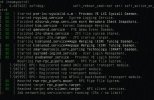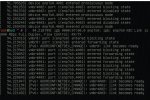4.4.5. Minimal system upgrade
In some cases, doing the full upgrade (as described below) directly might remove large numbers of packages that you will want to keep. We therefore recommend a two-part upgrade process: first a minimal upgrade to overcome these conflicts, then a full upgrade as described in
Section 4.4.6, “Upgrading the system”.
To do this, first run:
# apt upgrade --without-new-pkgs
This has the effect of upgrading those packages which can be upgraded without requiring any other packages to be removed or installed.
The minimal system upgrade can also be useful when the system is tight on space and a full upgrade cannot be run due to space constraints.
If the apt-listchanges package is installed, it will (in its default configuration) show important information about upgraded packages in a pager after downloading the packages. Press
q after reading to exit the pager and continue the upgrade.
4.4.6. Upgrading the system
Once you have taken the previous steps, you are now ready to continue with the main part of the upgrade. Execute:
# apt full-upgrade



